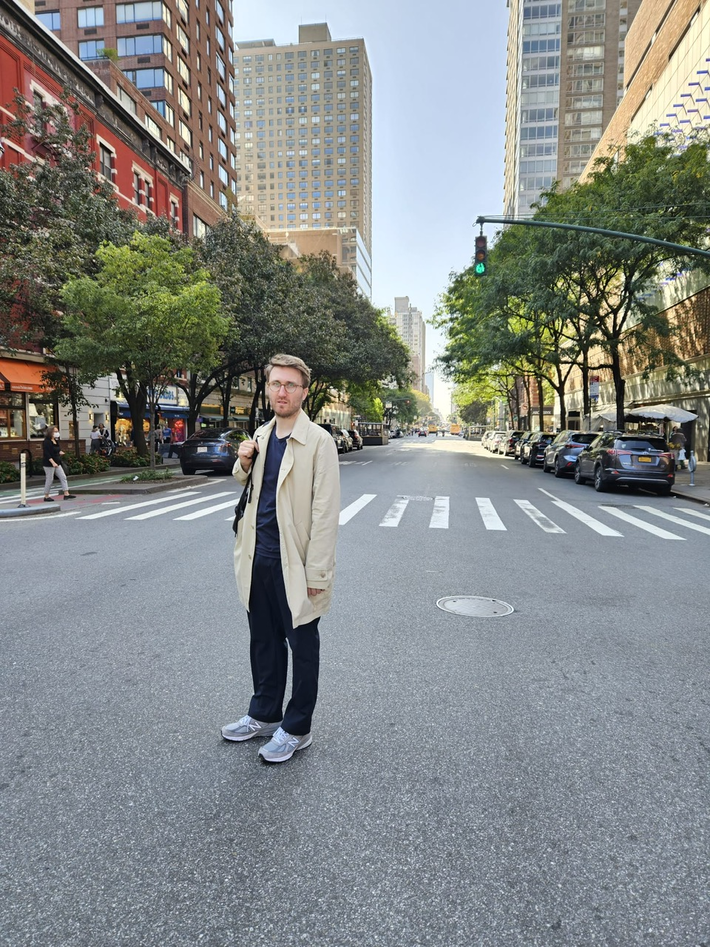Wolfgang Hottner receives Young Researcher’s Prize 2023
Wolfgang Hottner’s work on the role of inorganic materiality around 1800 poses new challenges for the research on the literature and aesthetics of the period. Now Hottner is awarded the Young Researchers Prize 2023 for his exceptional work and achievements.

Main content
Wolfgang Hottner’ s scientific work demonstrates an impressive historical breadth, including literary history, theory, aesthetics, and translation. With a broad and interdisciplinary academic background, and a meticulous attention to detail, Hottner has achieved significant success as researcher of the literature and the philosophy of the enlightenment.
Inorganic Aesthetics
“My work usually begins with the attention to a specific detail, a rather inconspicuous element of a text, a lead that at first glance seems marginal. Based on this, and in a very close relation to the material, broader questions and themes can be explored”, Hottner explains.
In his first book, Kristallisationen. Ästhetik und Poetik des Anorganischen im späten 18. Jahrhundert, he is focussing on inorganic matter in German enlightenment literature and philosophy. Hottner is showing how crystals and crystallizations play an important – and thus so far underappreciated – role in the work of Kant, Goethe, Schelling and Hölderlin.
“At the end of the 18th century there is a strong focus on the vitality of humans, animals and plants. Non-living materiality, like stones, fossils and crystals, are pushed into the background. Their forms, shapes and beauty are easily forgotten. I wanted to show that despite their seemingly marginal status, they nonetheless play a very important part in literature, art and aesthetics”, Hottner says.
This focus in the inorganic not only challenges long-standing research on Kant and Goethe, but also contributes to recent discussions about the Anthropocene and non-human agency.
“I was very happy to see that the book received positive reviews in newspapers and academic journals, and that it is read outside the field of literary studies, like art history”, Hottner says.
The book will soon come out in English under the title Crystallizations. Aesthetics and Poetics of the Inorganic in the late 18th Century.
The magical moment with Goethe
Especially the works of Goethe has been following Hottner. Recently, he discovered an important source for one of Goethe’s most famous novels Die Wahlverwandtschaften.
“I was doing archival research in Weimar, when I almost by accident, discovered this treatise, which Goethe re-writes in a central passage in the novel. When I first realized what I had found, I could not believe it! It was almost too incredible that nobody had seen this before,” Hottner says.
The discovery changes not only the way we look at the novel, but also gives us a better understanding of Goethe’s working technique.
“The discovery of a source for an important novel is seldom in my profession and a true magical moment”, Hottner says.
The article Vorzeit und Nachwelt: Archivtheorie und Denkmalschutz in J.W. Goethes 'Die Wahlverwandtschaften was published in the renowned journal Deutsche Vierteljahrsschrift für Literaturwissenschaft und Geistesgeschichte.
Exploring Western Norway with Fosse
Hottner found the transition from Berlin to Bergen quite tough in the beginning but is slowly finding his place and settling in with friends and colleagues.
“The life in Berlin was quite different, but I really enjoy the collaborative spirit in Bergen and at UiB. You get in contact with colleagues more easily. I also appreciate the collaboration between different cultural and artistic institutions in Bergen”.
Reading Jon Fosse has also helped Hottner understand how Western Norway works.
“I have read a lot of Jon Fosse after coming here. It was a good way to access the language, the landscape, and the beauty of the landscape”, Hottner says smiling.
Hottner, who has been writing literature criticism for german newspapers and journals for many years, has just published a longer essay on Fosse’s background in Comparative Literature, his time as a teacher at Skrivekunstakademiet and as a translator of German literature. It came out in the first issue of the new journal Berlin Review. In addition to his work as a critic and researcher Hottner’s aim is to translate more literature from the Norwegian into German. As a start he translated an essay by Tor Ulven to German, which came out last year in the journal Sinn und Form.
“I want to work more on Norwegian literature, and the literary history of Bergen in general. Hopefully build a stronger connection between UiB and Skrivekunstakedemiet. Bergen is a great literary city, and it is nice to be a small part of it all “.
